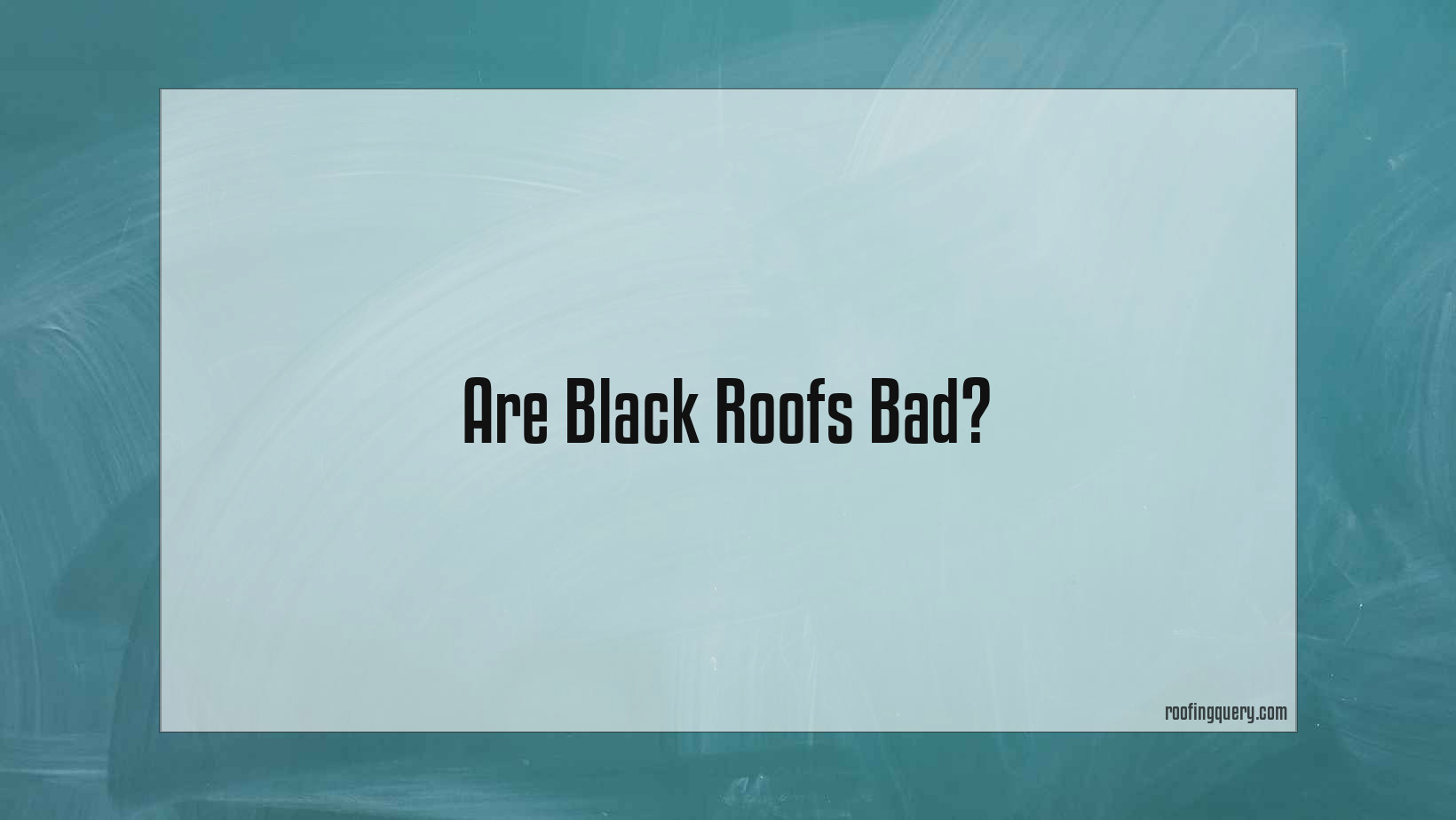No, black roofs are not bad.
The short answer is no, black roofs are not bad. In fact, they can be quite good, providing a number of benefits.
Black roofs absorb more heat than lighter-colored roofs, which can help to keep a building cooler in hot weather. This can reduce the need for air conditioning, leading to lower energy bills.
In cold weather, a black roof will absorb heat from the sun and help to keep the building warm. This can again lead to lower energy bills, as well as reducing the carbon footprint of the building.
A black roof can also help to prolong the life of the roof itself, as it will absorb less UV radiation than a lighter-colored roof. This can help to reduce the amount of maintenance required over the years.
Overall, then, there are a number of advantages to having a black roof. Of course, there are also a few downsides to consider.
One potential downside is that a black roof can make a building stand out more, which may not be desirable in some cases. Additionally, a black roof will absorb more heat than a lighter-colored roof, which could make the building uncomfortably warm in some cases.
However, overall, the advantages of a black roof outweigh the disadvantages. If you are considering a new roof for your home or business, a black roof is definitely worth considering.
Are Black Roofs Bad For Your Home?
No, black roofs are not bad for your home.

A black roof can actually be good for your home, as it will absorb more heat and help keep your home cooler in the summer. However, a black roof can also be bad for your home if it is not properly maintained. If you have a black roof, you will need to make sure that you regularly clean it and check for any damage.
Are Black Roofs More Likely To Absorb Heat?
Yes, black roofs are more likely to absorb heat.
Yes, black roofs are more likely to absorb heat. The darker the color, the more heat it will absorb. This is why you’ll often see black asphalt shingles on roofs in hot climates. The extra heat absorption helps keep the inside of the house cooler.
While a black roof will absorb more heat than a white roof, both colors will eventually reach the same temperature. The difference is that it will take longer for a black roof to cool down at night.
If you’re looking to keep your home cooler in the summer, a white or light-colored roof is your best bet. These colors reflect sunlight and heat, rather than absorbing it.
Do Black Roofs Make Your Home Hotter?
Black roofs do not make your home hotter.
A black roof can make your home hotter in the summertime. This is because the black color absorbs more heat than lighter colors. In the wintertime, a black roof can actually help keep your home warmer because it will absorb the sun’s heat and radiate it back into your home. So if you live in a hot climate, a black roof may not be the best choice for you. But if you live in a colder climate, a black roof can help you save on energy costs.
Are Black Roofs More Prone To Fading?
Yes, black roofs are more prone to fading.
A black roof
Can be a beautiful addition to a home. But are black roofs more prone to fading?
It’s a common question we get here at our roofing company. And the answer is…maybe.
Here’s a breakdown of why that is and what you can do to protect your black roof from fading.
Why Are Black Roofs More Prone to Fading?
Simply put, black roofs absorb more heat than lighter colored roofs. And when roofs get too hot, the shingles can start to break down and fade.
Now, this doesn’t mean that all black roofs are doomed to fade. There are a few things you can do to help protect your roof and keep it looking great for years to come.
How to Protect Your Black Roof from Fading
There are a few things you can do to help protect your black roof from fading:
1. Install roof ventilation. This will help to keep your roof cool and will also extend its lifespan.
2. Choose a high-quality shingle. Not all shingles are created equal. Choose a shingle that is designed to withstand high temperatures and harsh weather conditions.
3. Have your roof professionally inspected and cleaned. This will help to ensure that your roof is in good condition and will help to prevent fading.
4. Consider a warranty. Many roofing companies offer warranties on their products. This can give you peace of mind knowing that your roof is protected against fading.
Real-Life Example
We recently had a customer who was concerned about the fading of her black roof. We inspected her roof and found that it was in good condition. We recommended she have her roof cleaned and that she install roof ventilation. We also recommended she choose a high-quality shingle for her next roof.
The Bottom Line
Are black roofs more prone to fading?
Yes, they can be. But there are a few things you can do to help prevent it. Install roof ventilation, choose a high-quality shingle, and have your roof professionally inspected and cleaned. You should also consider a warranty for added protection.
FAQ
Are Black Roofs More Difficult To Keep Clean?
Are Black Roofs More Likely To Attract Insects?
Are Black Roofs More Likely To Be Damaged In A Storm?
Are Black Roofs More Likely To Leak?
Conclusion
There is no simple answer to this question as there are both pros and cons to having a black roof. Some people may find that a black roof absorbs too much heat, making their home uncomfortably warm, while others may appreciate the sleek and modern look of a black roof. Ultimately, the decision of whether or not to have a black roof is a personal one that depends on the individual’s specific needs and preferences.
Are black roofs a bad choice?

